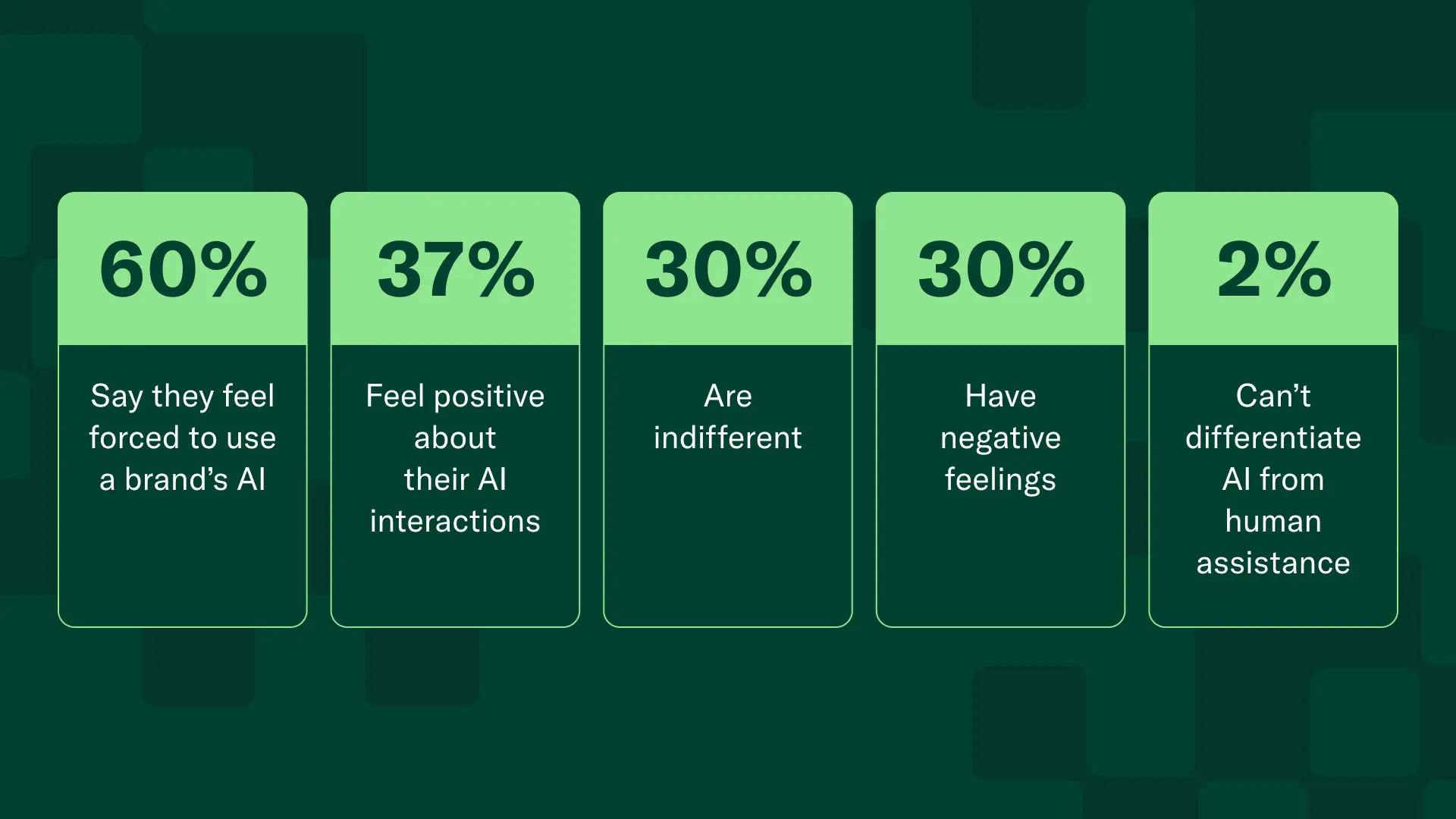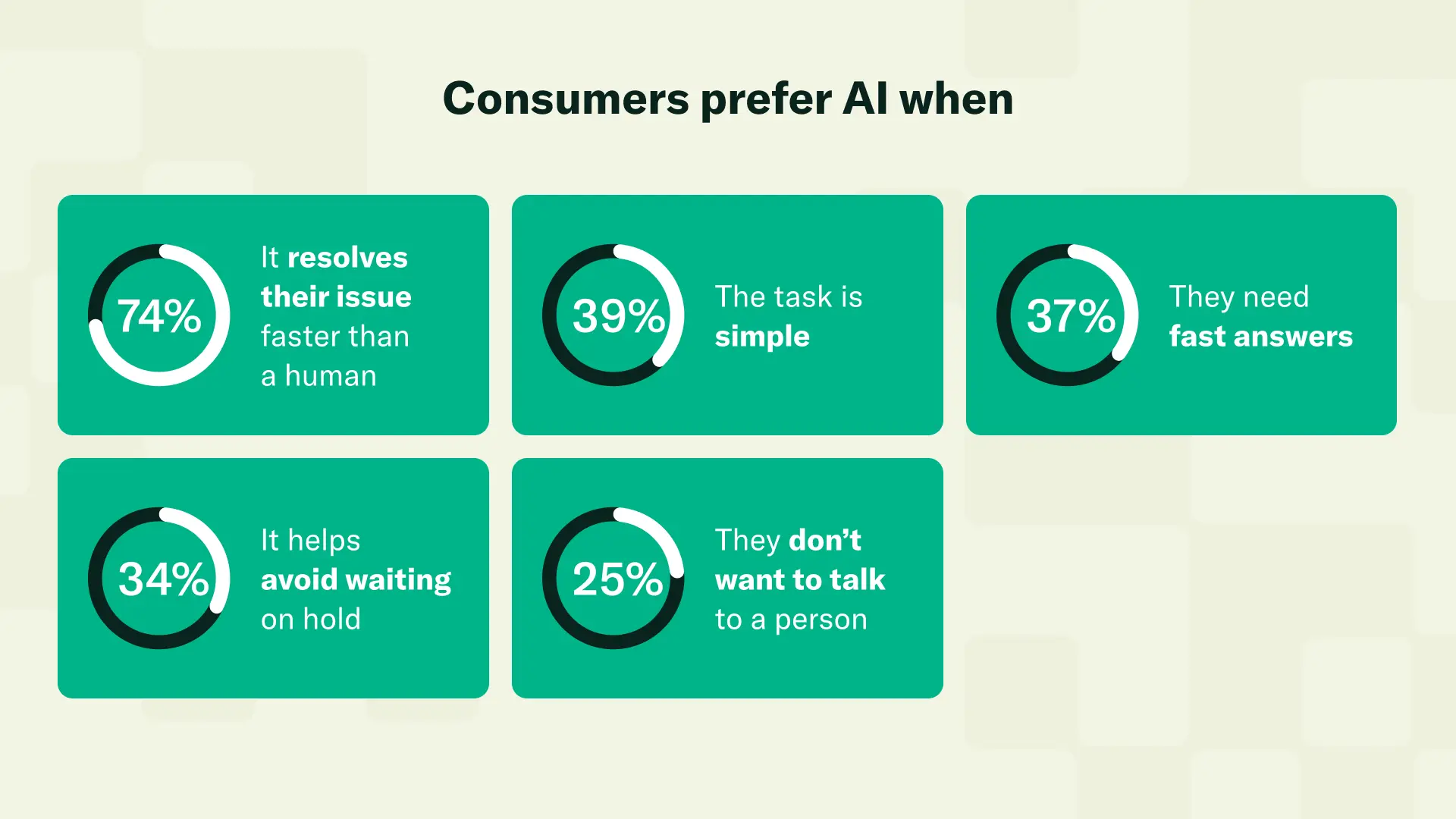Don’t have time to read? Listen to the AI podcast on the report!
Artificial intelligence is rapidly transforming the customer experience, as brands race to deploy this technology across their many touchpoints. The idea is to provide the fast, seamless interactions that modern consumers supposedly crave. But amid this rush to automate, a critical question emerges: Are we moving too fast?
Our survey of 1,000 US and UK consumers uncovered how people really feel about AI. While consumers show surprising acceptance of AI assistance during their buying journeys, undercurrents of frustration and preference for human connection persist — especially when the stakes are high. When consumers are navigating complex, high-value purchase decisions, they still overwhelmingly turn to human agents for the personalised guidance and trust that AI simply can't replicate.

For marketing, contact centre, and CX leaders, this presents both a challenge and an opportunity. The data suggests that the most successful customer experience strategies will strategically blend both AI and human agents. The winners will be those who not only use AI to automate assistance but also enhance human performance behind the scenes while preserving the authentic connections that drive conversions in high-stakes moments.
The question isn't whether AI has a place in customer experience — it's how to deploy it thoughtfully, ensuring that efficiency gains don't come at the cost of the personal relationships that ultimately close deals and build loyalty.
In the blog post below, we break down some of the top findings from the study as well as what they mean for marketing, contact centre, and CX teams.
Finding 1: Consumers Feel Forced to Use a Brand’s AI, but Many Have Positive Experiences with It
It’s essential to meet customers where they are, not where your tech stack wants them to be. Forcing consumers into rigid, AI-driven workflows just to get a question answered or make a purchase often leads to frustration, not conversion. And the data backs it up: 60% of consumers say they feel forced to use a brand’s AI. That’s not exactly a win for brands aiming to provide seamless buying experiences.
However, a surprising 37% of consumers say they feel positively about their AI interactions and 30% feel indifferent. Clearly, some customers are more open-minded about AI, and find that it can quickly and efficiently meet their needs. It all comes down to preference.
If AI is part of your customer experience strategy, it should enhance the interaction, not dominate or derail it. Customers want efficiency, but not at the expense of feeling heard, respected, and in control.

Finding 2: Consumers Prefer AI When It Resolves Their Issue Faster Than a Human
It’s no surprise that consumers may feel hesitant to rely on AI when making high-stakes purchases like a new car, luxury vacation package, or insurance policy. That said, there are scenarios where buyers are not only comfortable with AI but prefer it during the purchasing process.
Consumers tend to prefer AI when tasks are straightforward, like checking inventory, getting store hours, or receiving quick product recommendations. In these cases, automation can enhance the experience by removing friction and delivering fast, helpful answers.
But the moment things get more complex, trust in AI drops. In fact, 53% of consumers believe solving complicated problems is where AI performs worst. And while AI can assist in many parts of the journey, consumers still want an easy escape hatch to a human. A notable 77% said they’d be more willing to engage with AI if they knew how to connect with a real person when needed. Giving customers a clear path to a human is a prerequisite for AI acceptance.
Surprisingly, only 25% said they prefer AI when they don’t want to talk to a person. Avoiding human contact seems like the perfect use case for AI!

Finding 3: Gen Zers Are Most Likely to Accept AI, Boomers Most Likely to Oppose
If your customer base skews older, it’s especially important to approach AI implementation with care and intentionality. Attitudes toward AI vary significantly by generation, and failing to account for these differences could lead to disengagement or a loss of trust.
Older generations, particularly Baby Boomers, tend to view AI with a far more critical lens. Many are skeptical about its reliability and wary of its potential to replace human interaction. In fact, only 14% of Boomers said they’ve had a positive, memorable experience with a brand’s AI when making a high-stakes purchase. Gen X isn’t much more enthusiastic, often sharing similar concerns about the impersonality and perceived limitations of AI.
Contrast that with Gen Z, who are far more open to AI in the buying experience. Nearly 60% of Gen Z consumers report having a positive interaction with AI in high-stakes situations, suggesting not only comfort with the technology, but also an expectation that it will be part of the customer experience.
If you’re serving a multigenerational customer base, your AI strategy must account for varying levels of tech familiarity, trust, and preference for human interaction.
.webp)
Finding 4: Consumers Prefer to Call When Making a High-Stakes Purchase
While AI and other digital tools have added speed and convenience to the customer journey, they haven’t replaced the human touch, especially when it comes to high-stakes purchases. Consumers today have a wide range of channels at their fingertips, from chatbots and self-service portals to email and brand websites. Yet when the stakes are high and the decision really matters, most people still prefer to talk to a representative on the phone.
In fact, since 2022, the preference for calling has increased by 12%, while email usage has dropped by more than half. Notably, the preference for AI assistance has remained flat, indicating that consumers don’t view automation as a go-to resource in more complex or emotionally charged buying moments.
Why? Because in high-pressure moments, people don’t want canned responses or algorithmic guesses — they want expertise, empathy, and real conversation. They want to feel understood and supported, and they trust that a live human can provide that clarity and confidence.
.webp)
Finding 5: Consumers Believe AI Will Get More Helpful in the Next 3 Years
While today’s AI still has room for improvement, most consumers aren’t writing it off. In fact, nearly 60% of respondents say they’re confident AI will become significantly more helpful within the next three years. This signals a broad sense of optimism for AI’s future potential.
Interestingly, 42% believe AI will eventually replace human assistance altogether, though it’s not a universally welcomed shift. More than a quarter of that group (27%) said they wouldn't be happy about such a change.
When asked how AI can be improved, respondents were clear about their top priority: make it easier and faster to reach a human when needed. This finding underscores a recurring theme in the data: AI isn’t necessarily the problem — it’s the feeling of being trapped in a rigid, impersonal system that frustrates users.
.webp)
Invoca Combines the Best of AI and the Human Touch
Invoca helps brands deliver seamless customer experiences by combining the speed and convenience of AI with the empathy and nuance of human interaction. Invoca’s tools, like intelligent call routing, contact centre quality management, and PreSense, ensure that AI handles the repetitive tasks while humans handle the relationships. The result? Smoother handoffs, more relevant interactions, and customer experiences that feel effortless.
.webp)
Request a personalised demo of Invoca today to learn how our platform can help you build customer loyalty and drive revenue growth.
Download the Full Report for More Insights
Want to learn more about your customers’ attitudes toward AI? Check out the full Buyer Experience Benchmark Report.


